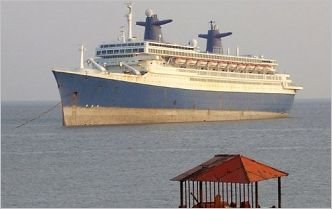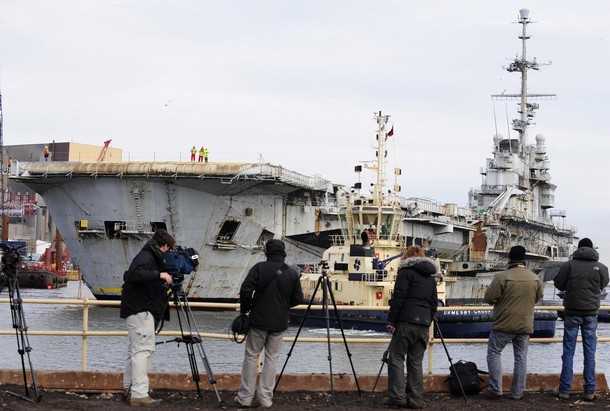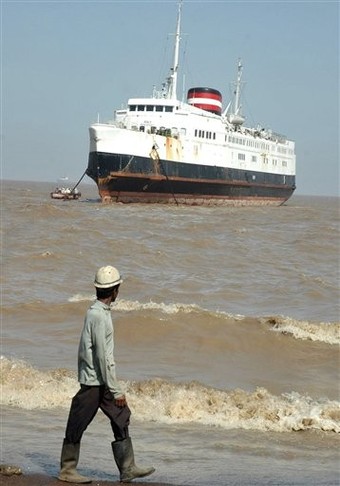Dead US Ship Makes Environment Ministry Anguished
New Delhi/4/1/2010: At a High Level Meeting held today at Paryavaran Bhavan chaired by Jairam Ramesh, the Union Environment Minister, the letter of Gujarat Maritime Board (GMB) in the matter of dead US ship Platinum II (SS Oceanic, SS Independence), Supreme Court order, a Navel Intelliegnce document, Basel Convention, the minutes of the inter-ministerial committee on shibreaking (IMC) and IMO's proposed treaty were discussed. The minister was anguished with the way the dead US ship has been dealt with by Gujarat authorities. He was unequivocal in stating that his ministry would ensure transparency, which would go a long way in setting matters right.
The GMB letter (in pictures at the bottom) addressed to Dr Saroj, Director, Hazardous Substances Management Division, Ministry of Environment & Forests informs that Gujarat Pollution Control Board (GPCB) has so far not submitted any information and opinion in the matter of violation of US Toxics Substances Control Act, which was mentioned in the Environment Ministry's order. Notably, the dead ship in question is not registered with the Directorate General of Shipping.
Instead of admitting dereliction of duty by the GMB and Customs, the letter speculates that US Coast Guard could not have allowed the dead US ship Platinum II (SS Oceanic, SS Independence) to leave US waters. It notes that no intimation from US or Dubai authorties have reached them so far.
There were apprehensions expressed about the veracity of the claim that the ship cannot be refloated again and its reference to as wreck was taken with a pinch of salt. Indian law with respect to wreck is laid down in Part XIII of the Merchant Shipping Act, 1958. The Section 2 (58) of Indian Merchant Shipping Act, 1958 defines ‘wreck’ in an inclusive manner so as to take in both ‘goods’ and ‘vessels’. The definition of wreck is vague. The term ‘vessel’, under Section 2 (55) of the Act includes any ship, boat, sailing vessel or other description of vessel used in navigation which has been abandoned without hope or intention of recovery. Thus abandonment is a prerequisite for a vessel to be treated as a wreck. The insistence on total abandonment without even a hope or intention of recovery clearly shows that a stranded vessel or a vessel that is reasonably expected to sink cannot be termed as a Wreck under the Act. This is not the case in teh matter of the dead US ship.
The Act after defining Wreck elaborates on norms governing the handling of Wreck in Part XIII which also deals with salvage. Even if it gets proven that the dead US toxic ship is wreck, even then the Act provides that the Central Government may appoint a receiver to receive and take possession of the wreck and to perform such duties as envisaged under Section 391 of the Act. Clearly, GMB is motive in commiting a linguistic corruption of defing a floating hazardous waste is to use the lacunae in the Indian law relating to the handling and removal of wrecks that has been permitting the perpetrators of illegality to go scot-free and the public exchequer is burdened with the task of meeting the huge expenses for wreck removal. The owner of the dead US ship must be made liable for his acts of ommission and commission.
Notably, under the Act for a vessel to be a wreck it has to be abandoned without hope or intention of recovery. There has to be a positive act of abandonment so as to constitute a wreck and to empower the receiver to meddle with the same. In the case of a foreign vessel if its wreck or cargos are found on or near the Indian coast or are brought to any Indian port, in the absence of the master/owner, the statute under Section 399 (2) mandates that the consular officer of the country in which the vessel is registered or the cargo owners belong, shall be deemed to be the agent of the owner with respect to the custody and disposal of the articles. GMB is not revealing whether it has approached the consular officer of the country to which the dead US ship belongs.
As per the Supreme Court of India, "Before a ship arrives at port, it should have proper consent from the concerned authority or the State Maritime Board, stating that it does not contain any hazardous waste or radioactive substances." And with regard to hazardous wastes, its orders "Disposal of waste material, viz. oil, cotton, dead cargo of inorganic material like hydrated/solidified elements, thermo- Cole pieces, glass wool, rubber, broken tiles, etc. should be done in a proper manner, utilizing technologies that meet the criteria of an effective destruction efficiency of 99.9 per cent, with no generation of persistent organic pollutants, and complete containment of all gaseous, liquid and solid residues for analysis and, if needed, reprocessing. Such disposed of material should be kept at a specified place earmarked for this purpose. Special care must be taken in the handling of asbestos wastes, and total quantities of such waste should be made known to the concerned authorities. The Gujarat Pollution Control Board should authorize appropriate final disposal of asbestos wastes."
With regard to international environmental law, the court's order reads, "At the international level, India should participate in international meetings on shipbreaking at the level of the International Maritime Organization and the Basel Convention’s Technical Working Group with a clear mandate for the decontamination of ships of their hazardous substances such as asbestos, waste oil, gas and PCBs, prior to export to India for breaking."
Shockingly, in the case of dead US ship Platinum II (SS Oceanic, SS Independence), the above order has not been complied with nor has it been claimed that it has been complied with in the face of clear evidence of the ship being laden with asbestos, PCBs and radioactive material.
An environmental health researcher, an applicant in the Supreme Court and a complaint before the Ministry, Gopal Krishna was invited at the High Level Meeting. He submitted that the ship in question is a floating hazardous waste that has been dumped in the country without manadatory pre-cleaning using procedural flaws and gullible officials unmindful of the alarmingly high level of accidents and diseases in Alang.
Participants at the High Level Meeting included environment ministry officials like R H Khwaja, Additional Secretary, Rajiv Gauba, Joint Secretary, Director, Hazardous Substances Management Division expressed deep anguish at the failure of the GMB to invoke precautionary principle to deal with the dubious ship once beaching and breaking permission has been withheld. The ministry expects that other concerned ministries of steel and shipping would take immediate action to ensure that national and international laws are complied with and the guilty are brough to book.
For Details
Gopal Krishna
ToxicsWatch/Indian Platform on Shipbreaking
New Delhi
Mb: 9818089660
Skype id: witnesskrishna
E-mail: krishnagreen@gmail.com
Blog: imowatch.blogspot.com












No comments:
Post a Comment